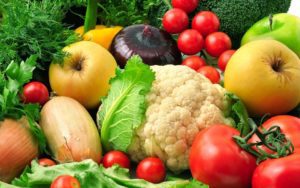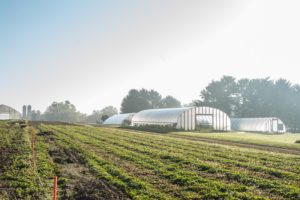
The Ukraine Horticulture Business Development Project (UHBDP) has announced the launch of the new grant program Small Environmental Grants to support horticulture business in Ukraine with a budget of CAD 125,000. “We would like to announce a new program of small grants… If we talk about the producers of fruits, vegetables and honey, then we are implementing this project in four southern regions of Ukraine, in which this production is focused: Mykolaiv, Kherson, Odesa and Zaporizhia regions. However, we understand that IT companies are located in different cities, therefore, we will accept applications from other regions of Ukraine for this part of the program,” UHBDP project manager Dmytro Nikolaev told reporters at the third Organic Ukraine 2019 International Congress on Friday.
UHBDP sees producers of honey, vegetables, fruits, berries and other producers of fruits and vegetables with and without organic certification, suppliers of equipment and IT tools among the program participants.
A mandatory condition for participation is an officially registered business.
The amount of grant assistance is from CAD 8,000 to CAD 12,500 for one project. The results of the grant competition will be announced by September 2019. Applications for participation in the competition can be submitted on the project’s website from April 1 to April 15, 2019.

The U.S. Jabil Circuit has invested $16 million in the construction of a second stage of the electronics manufacturing site in the village of Rozivka, Zakarpattia region, Jabil Director General in Ukraine Serhiy Kartsev told reporters at the presentation of the plant on Friday. With the opening of the second stage, the site’s area has doubled to 46,600 square meters, and in the short term, Jabil plans to increase the staff to 5,000.
“Since the founding of the first Jabil manufacturing site in Ukraine, we have invested over $2 million in infrastructure facilities, which were later transferred to the village council. In particular, we built two new wastewater treatment plants, one of which is intended for Rozivka and it is our contribution to development of the environment protection in the region,” Kartsev said.
According to Kartsev, the Jabil plant in Uzhgorod is the only one in Europe engaged in the production of full-cycle products, the plant is constantly expanding its production capacity.
The plant also collaborates with more than 20 universities of Ukraine, including 25 engineering faculties, which programs have certain specifications for work with Jabil.
About 65% of the volume of products manufactured at the site is intended for the telecom industry. Also, Uzhgorod plant produces goods for the smart home market, consumer goods and goods for the automotive industry.
Mobile phones, media players and PCs for exports to the European Union will be assembled at the new site.
Jabil Circuit is among top three global leaders among companies offering supply chain solutions. Electronics for Nespresso, Ceragon, Sagemcom, SIAE Microelettronica, DUCATI Energia, SIT and TeleTec brands is assembled at the Uzhgorod site
Jabil is an electronic product solutions company providing comprehensive electronics design, production and product management services to global electronics and technology companies.
The first manufacturing site in Zakarpattia region was launched in 2004. As of early 2019, around 3,000 employees worked there.
CONSTRUCTION, ELECTRONICS, INVESTS, JABIL CIRCUIT, MANUFACTURING SITE

Kyivstar, the leading Ukrainian mobile communications operator, plans to invest in the development of 4G (LTE) standard by 18-20% more in 2019 compared with 2018, Kyivstar President Alexander Komarov has said. In 2018, capital expenses of the company totaled UAH 3.1 billion. “In 2018, we increased investment in LTE by 18%. In 2019 and 2020, we are planning to maintain the same growth pace and even more – up to 20%,” he told reporters in Kyiv on Thursday.
Komarov said that Kyivstar, like other mobile operators that have purchased 3G and 4G licenses at tenders, are now in the middle of the investment cycle for implementing these communication standards.
“For a few more years, we will actively invest in comparative amounts in LTE, about UAH 3 billion a year,” the president of the largest operator said.
He said that at present, Kyivstar is focusing on the introduction of a more promising in terms of speed and data volume transmission 4G. The president of the company said that if the state is ready to provide the operator with frequencies in the range of 700-800 MHz and ensure the principle of technology neutrality for the market, the above investments can be increased to cover new village communication standards and reduce the “digital gap.”
Komarov also expressed the opinion that the possible implementation of the 5G communication standard in the Ukrainian market is still premature, since it is ahead of the market needs and the willingness of market players to invest.
At the same time, he said that Kyivstar intends to invest annually about UAH 100 million of its own funds in new promising business areas, among which he called FinTech, Internet of Things (IoT), cloud solutions and technologies, big data.
According to him, the goal is to bring the share of this new income of the total income of Kyivstar over three years to 10%. The president of the company said that the search for optimal forms of cooperation with possible partners in these areas is currently underway.

The number of certified operators of organic production in Ukraine in 2018, according to preliminary data, increased to 588 from 504 compared with 2017, the relevant data are contained in the presentation of the Organic Ukraine public organization at the third international congress Organic Ukraine.
According to the presentation, out of the total number of operators there are 324 crop producers and 16 livestock producers.
“The area under organic farming will decrease by the end of 2018. The number of producers is increasing, while the area is decreasing. Large farms find it difficult to cope with the challenges associated with organic production. Some producers refuse to grow organic goods: they cannot fulfill the conditions, others are decertified,” Serhiy Halashevsky, the director of the Organic Standard certification authority, said.
According to him, the area under organic production will slightly reduce due to the fact that “the areas are reduced due to decertification and simultaneously the number of new producers who have passed the transition period and received the status of organic is increasing.”